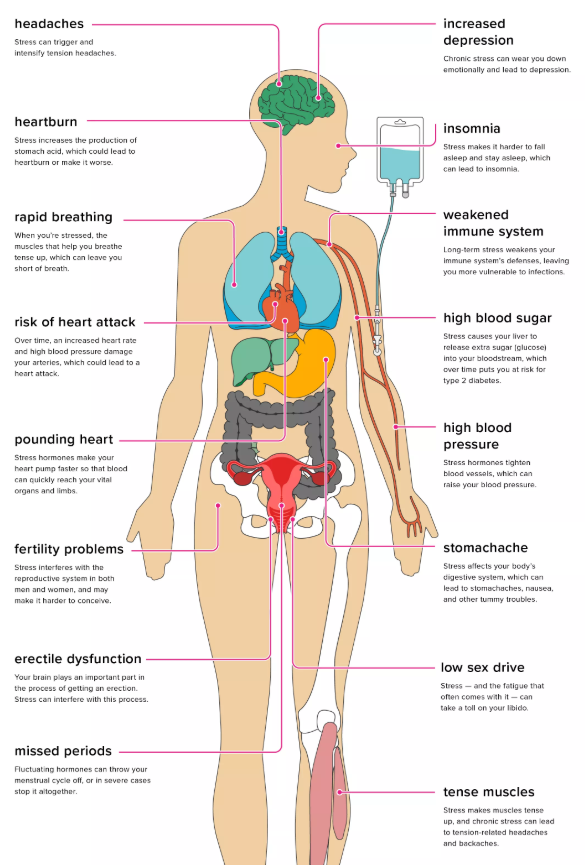Stress and CBD.
What is stress and what are the effects of stress on the body? What are the consequences of chronic stress and what can you do to reduce it? And what role does CBD play in reducing stress? We have answers.
What is Stress?
According to The American Institute of Stress (AOI), there is no one standard definition. The most common description of stress is mentally, physically, or emotionally strained or tense.
The term stress is used to denote anything that may affect the balance and stability of body functions. Almost any type of stress results in a physical, physiological, or biochemical response. This “stress response” or “fight-or-flight” reaction is your body’s defense system kicking in. It is an automatic process in response to any demand or threat.
Stress is not always harmful.
Stress is a natural response to life events, and the changes it produces in your body may help you better respond to those events. Increased heart and breathing rates are a sure sign that your body is releasing stress hormones (adrenaline, cortisol, and norepinephrine). Stress hormones, affecting your respiratory and cardiovascular systems, help you breathe faster to distribute oxygen-rich blood to your body.
Stress hormones also cause blood vessels to constrict, diverting oxygen to regions of the body where it is needed most. Your blood pressure may also increase.
Eustress (normal psychological stress interpreted as being beneficial), can result in increased productivity. An example of this is the “stress” you might experience to meet a deadline, such as writing a blog post, taking an exam, or presenting a proposal to a client.
When is stress harmful?
Stress can impact your health negatively when stress levels stay elevated far longer than necessary. Stress affects all parts of your body.
Your Digestive System Under Stress.
When you are under stress, your liver produces glucose (blood sugar) to give you a boost of energy. Chronic stress may cause your body to produce too much glucose and may increase your risk of developing type 2 diabetes.
Furthermore, rapid breathing and an increased heart rate can increase stomach acid and the likelihood of acid reflux, and cause nausea, diarrhea, or constipation.
Your Immune System Under Stress.
Stress hormones can help you avoid infections and heal wounds by stimulating the immune system. Chronic stress over time can, however, make you more vulnerable to illnesses including, but not limited to the flu or common cold. Also, it may take you longer to recover.
Your Muscular System Under Stress.
Muscles tense up to help protect you from injury—it’s a natural stress response. Tensing can lead to sore muscles in your neck, back, and shoulder, as well as headaches.
Your Reproductive System Under Stress.
Chronic stress affects the reproductive system of both men and women. In men, long term stress can cause testosterone levels to drop. As well as interfering with sperm production, this can cause erectile dysfunction or impotence. It may also increase the risk of infection in the prostate and testes.
In women, stress can affect the menstrual cycle, which can lead to irregular, heavy, and more painful periods. It can also increase menopause symptoms.
How Stress Affects Your Body.

Graphic: The American Institute of Stress. How Stress Affects Your Body.
According to a report by the American Psychological Association:
- 77% of people regularly experience physical symptoms caused by stress
- 73% of people regularly experience psychological symptoms caused by stress
- 33% feel they are living with extreme stress
- 48% feel their stress has increased over the past five years
- 48% report lying awake at night due to stress
- 30% report they are always or often under stress at work
They go on to state those who experience stress cite physical symptoms to include:
- Fatigue 51%
- Headache 44%
- Upset stomach 34%
- Muscle tension 30%
- Change in appetite 23%
Furthermore, psychological symptoms include:
- Irritability or anger
- Feeling nervous
- Lack of energy
- Feeling as though you could cry
So What Can You Do To Reduce Stress?
Some stress can help us get the pick-me-up we need to get through exams, work deadlines, or other situations where we need to get things done. But too much stress can have health consequences and take an emotional toll on our well-being.
 So what can you do? Here are several things you may try:
So what can you do? Here are several things you may try:
- Get regular exercise.
- Practice mindfulness. This includes deep breathing, meditation, yoga, or tai chi.
- Get a massage.
- Get social. Spend time with family and friends.
- Make time for a hobby you enjoy.
- Smile and laugh. A sense of humor is good for you.
- Get a good night’s sleep.
- Take a break from whatever is stressing you if you can.
- Eat healthfully.
- Try a CBD product, such as CANVIVA CALM CBD Oil tincture, with Bergamot and Ylang Ylang essential oils.
